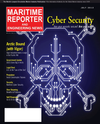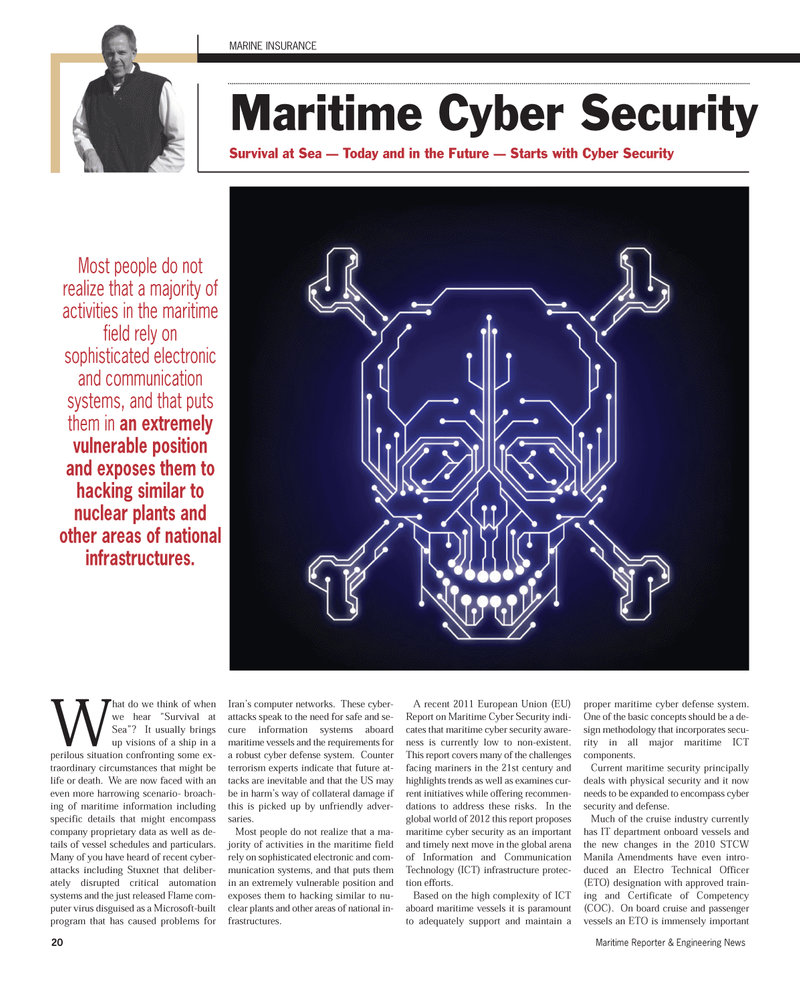
Page 20: of Maritime Reporter Magazine (July 2012)
Arctic Operations
Read this page in Pdf, Flash or Html5 edition of July 2012 Maritime Reporter Magazine
20Maritime Reporter & Engineering News What do we think of whenwe hear ?Survival at Sea?? It usually bringsup visions of a ship in aperilous situation confronting some ex- traordinary circumstances that might belife or death. We are now faced with an even more harrowing scenario- broach- ing of maritime information includingspecific details that might encompass company proprietary data as well as de- tails of vessel schedules and particulars. Many of you have heard of recent cyber- attacks including Stuxnet that deliber- ately disrupted critical automationsystems and the just released Flame com-puter virus disguised as a Microsoft-built program that has caused problems forIran?s computer networks. These cyber- attacks speak to the need for safe and se-cure information systems aboardmaritime vessels and the requirements for a robust cyber defense system. Counter terrorism experts indicate that future at- tacks are inevitable and that the US may be in harm?s way of collateral damage if this is picked up by unfriendly adver- saries.Most people do not realize that a ma-jority of activities in the maritime field rely on sophisticated electronic and com-munication systems, and that puts themin an extremely vulnerable position and exposes them to hacking similar to nu- clear plants and other areas of national in-frastructures.A recent 2011 European Union (EU)Report on Maritime Cyber Security indi-cates that maritime cyber security aware- ness is currently low to non-existent. This report covers many of the challenges facing mariners in the 21st century and highlights trends as well as examines cur- rent initiatives while offering recommen- dations to address these risks. In theglobal world of 2012 this report proposes maritime cyber security as an important and timely next move in the global arena of Information and CommunicationTechnology (ICT) infrastructure protec- tion efforts. Based on the high complexity of ICT aboard maritime vessels it is paramount to adequately support and maintain aproper maritime cyber defense system. One of the basic concepts should be a de-sign methodology that incorporates secu-rity in all major maritime ICTcomponents.Current maritime security principallydeals with physical security and it now needs to be expanded to encompass cyber security and defense.Much of the cruise industry currentlyhas IT department onboard vessels and the new changes in the 2010 STCW Manila Amendments have even intro- duced an Electro Technical Officer (ETO) designation with approved train- ing and Certificate of Competency (COC). On board cruise and passengervessels an ETO is immensely important MARINE INSURANCEMaritime Cyber SecuritySurvival at Sea ? Today and in the Future ? Starts with Cyber Security Most people do not realize that a majority of activities in the maritimefield rely on sophisticated electronic and communication systems, and that putsthem in an extremely vulnerable positionand exposes them tohacking similar to nuclear plants andother areas of national infrastructures. MR#7 (18-25):MR Template 7/6/2012 10:21 AM Page 20

 19
19

 21
21
